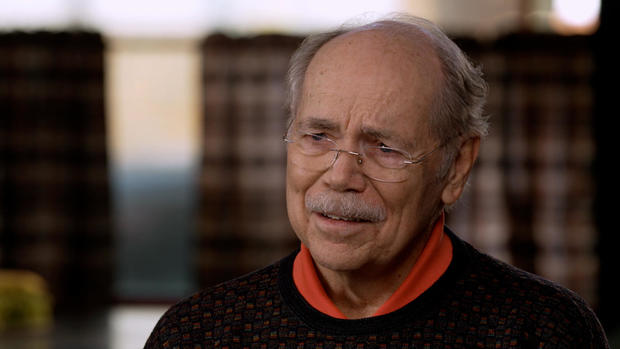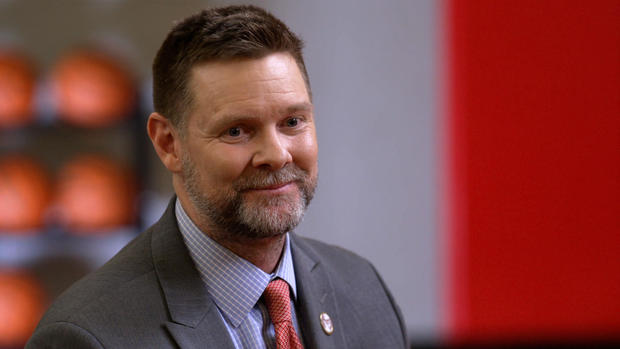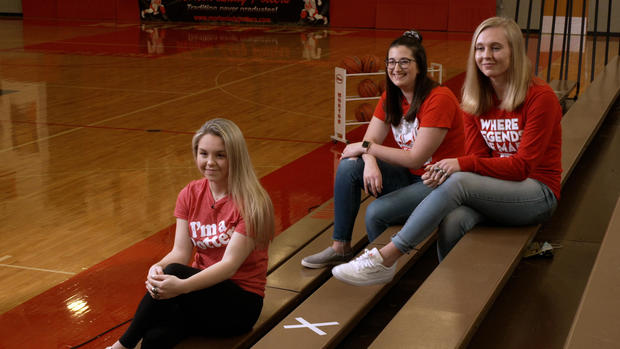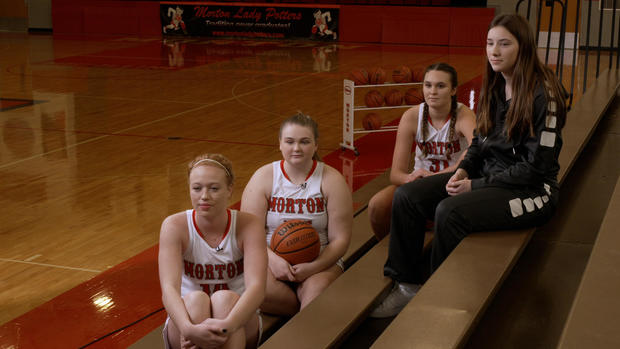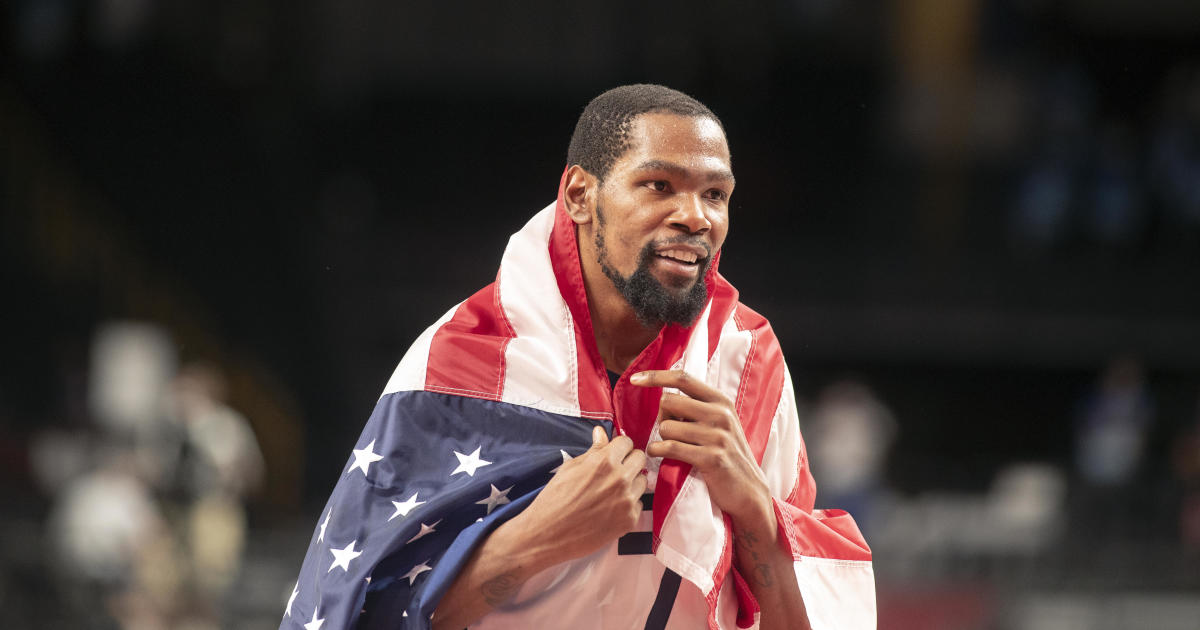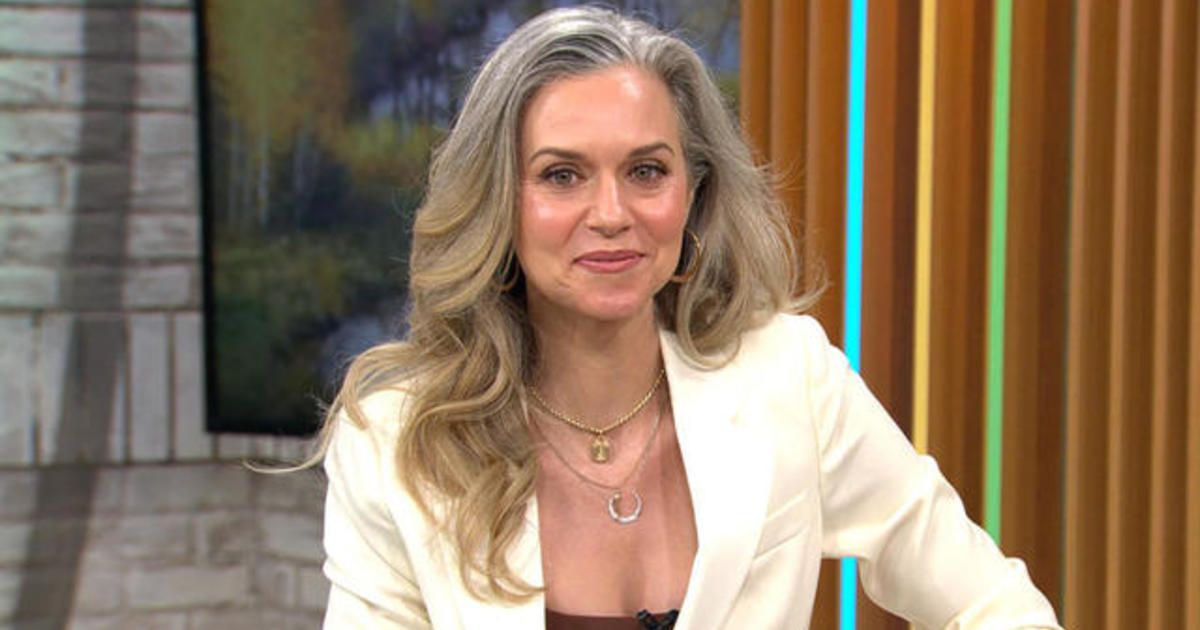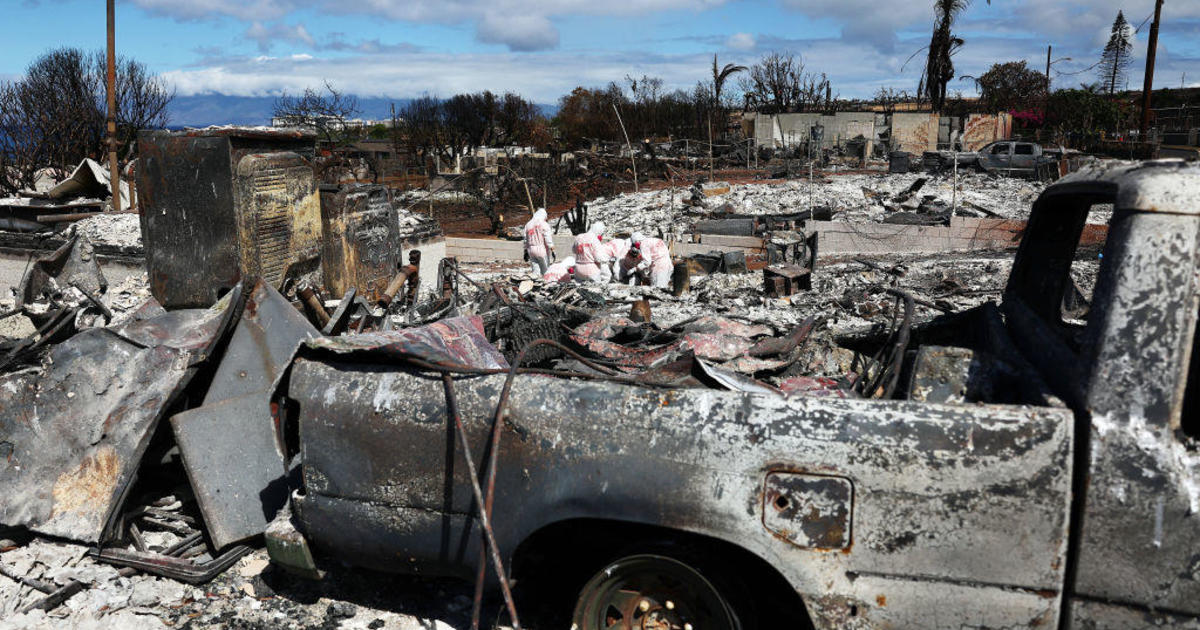Dave Kindred goes back on the beat to cover high school girls basketball
It's one of the guiding principles of journalism, the reporter should never become the story. Every now and then though, you find a reporter's story too good not to tell. In 2018, Dave Kindred received the PEN/ESPN Lifetime Achievement Award for Literary Sportswriting, it was intended as a final bit of punctuation on a gilded career. Little did the presenters know, Kindred was still churning out column after column; sweating deadlines; interviewing athletes after exhilarating wins and deflating losses.
Kindred, though, wasn't setting up shop—as he had for 50 years— at Super Bowls, World Series games, Olympics, and title fights. No, he was scribbling away three rows up the bleachers, inside high school gyms of central Illinois. And it would make for some of the most fulfilling work of Kindred's career.
For more than a half-century, Dave Kindred abided a simple sportswriting rule – be a reporter first, and a writer second. On the sidelines or the back nine, he wanted to be there, find the story, and then paint a picture using words.
Jon Wertheim: Let's do the sportswriter equivalent of back-of-the-baseball card. Gimme the numbers here. How many World Series you been to?
Dave Kindred: I became a columnist in '69. So went to a lot of-- almost all the World Series after that.
Jon Wertheim: How many Super Bowls have you been to?
Dave Kindred: Forty-somethin'.
Jon Wertheim: What about the Masters?
Dave Kindred: I've been to 52 Masters.
Jon Wertheim: Man.
Dave Kindred: First in 1967 and-- missed 1986 when nothing happened except Jack Nicklaus won.
Unlike the athletes and teams they cover, sportswriters aren't ranked. There's no scoreboard or leaderboard. Still, even in this subjective line of work, there are perennial all-stars and hall of famers – say Sports Illustrated's Frank Deford and Red Smith of the New York Times, whose Sunday column would arrive by train near Dave Kindred's childhood home of Atlanta, Illinois, a speck alongside Route 66. Kindred would race to the station, get a copy of the newspaper, and read every word.
Dave Kindred: I studied them. You know, one of the things I've learned about writing is find out what you like. Then figure out why you like it, and then do that.
Jon Wertheim: So why did you like it?
Dave Kindred: I liked the rhythm of his words. Red didn't use, you know, kinda sportswriter hackney words. He used words that-- had a music to them.
Jon Wertheim: You're here in the middle of Illinois and you're reading these dispatches about sports, but from all over the world.
Dave Kindred: Yeah, it took me out of that second floor bedroom, you know, and put me in the press box at Wimbledon.
Kindred wrote what he saw – and became one of the most influential sports columnists and authors of a generation. Name sports icons from the last half century and rest assured, Dave Kindred's covered them. To him, though, one athlete was the greatest. In 1966, Kindred was a cub reporter at the Louisville Courier Journal, ordered by his boss to go find the outgoing, ascending local fighter.
Jon Wertheim: You meet Muhammad Ali for the very first time. That seems like a pretty big pivot point in your career. How did you think of it at the time?
Dave Kindred: At the time, I just thought of it, "This is a good story." You know, "This is fun. Guy's the heavyweight champion of the world."
It marked the first of more than 300 interviews with Ali, who christened Dave Kindred 'Louisville' – forever Ali's hometown reporter. Kindred followed Ali's entire career, an entomologist, as it were, writing about the butterfly and the bee - sometimes in the strangest of places.
Dave Kindred: I was trying to do a column on his entourage. Meanwhile his suite, as always, was full of people. He waves at me. "Louisville!" "Come in here." So I go in there, and I'm standing next to the bed. He raises up the corner of the s-- sheets and says, "Get in." Well, I don't know what you do if the heavyweight champion of the world tells you get in, but I did. You know? And one of us had on clothes.
He saved that anecdote for a 2006 duel biography he wrote about Muhammad Ali and Howard Cosell. Dave Kindred moved on from Louisville to the Washington Post, the Atlanta Journal-Constitution and the Sporting News. Kindred became one those hall of famers; his writings are preserved in the library of his alma mater, Illinois Wesleyan University, where we unearthed this gem.
Jon Wertheim: After the death of the NBA player, Pete Maravich, you wrote, "An inelegant collection of bones, the skinny, 6'5" Maravich flailed his way downcourt. Elbows and knees, sharp angles rearranging themselves. An Ichabod Crane on the fast break. And you dared not blink."
Dave Kindred: That's pretty good.
Kindred wrote that line 33 years ago.
Jon Wertheim: Where did you come up with that?
Dave Kindred: No idea, other than that's what he looked like. You want the reader to see the moment the way you see it.
He would have kept at it, but for the sad and steady decline of both print media and the role of the general columnist. In 2010, Dave Kindred and his wife Cheryl — high school sweethearts in the 50s — figured it was time to return home to the flat abs of America, central Illinois. They'd sit by the pond outside their log cabin, read and watch sunsets. And when the cold whipped in winter, they, like a lot of folks downstate, would repair to the warmth of a local high school gym for entertainment – in their case it was in Morton, Illinois – next town over from Peoria—to watch the Lady Potters.
Dave Kindred: I went to a basketball game. And like the old war horse, I couldn't sit there and not write about what I saw.
Kindred and his wife sat in the bleachers, alongside parents, grandparents and high schoolers and his professional instincts kicked in. He offered to cover the Lady Potters for the team's website and post his accounts on facebook as well. But first, he wanted the blessing of the team's coach.
Bob Becker: He's, you know, Muhammad Ali and Olympics and Masters Golf, and Super Bowls, and Bobby Knight. And here I am, a small town girls basketball coach.
Bob Becker has been head coach of the Lady Potters since 1999. After some apprehension – who wants to get second guessed by a hard-boiled journalist – he bought in.
Bob Becker: You know, after that initial shock, getting to know who he really was, after a little bit of research, we've got the Michael Jordan of sports writing falls in our lap.
The scribe who once described an NBA player as "Ichabod Crane on a fast break" now called his new subjects, "the Golden State Warriors with ponytails." And there was something about girls basketball that particularly enthralled Kindred.
Dave Kindred: I think I'd owed a little bit to Title IX. The women athletes, you know I loved seeing them play. And why should they be ignored in high school athletics? The men's game is vertical. The girls' game is horizontal. They have to master the fundamentals. So it's much more fun to watch them. And plus, they don't pout. They don't bitch.
For now, COVID has shrunk the season and the crowds in the Potterdome. But Kindred's there – his gaze fixed on the action, listening in on huddles. After the buzzer, he's outside the locker room for a quote. Albeit self-imposed, there is a deadline, so after driving home, he ends the day, as ever, in front of a keyboard.
Bob Becker: People stay up after the game, waiting for that article to come out. They won't go to bed until they get to read it. So he's got deadlines to meet, he's not gettin' paid anything but-- eventually, it turned into a box of Milk Duds.
You heard right. Kindred's negotiated compensation...
Dave Kindred: I said, "Look, I'm a professional sportswriter. I should be getting something for doin' all this stuff for you." And he measured my talent and experience and good looks and said, "How about a box of Milk Duds every game?" And I said, "Deal."
Jon Wertheim: You drive a hard bargain, Kindred.
Then in 2015, well, you might say the Milk Duds would turn into Lifesavers.
Jon Wertheim: Apart from the sugar rush, what do you get out of this?
Dave Kindred: Well, the first five years, it was just the fun. Then things started happening, as-- as they do late in life. Had a grandson who died. My mother died three months later. The next year, my wife had a catastrophic stroke that left her an invalid who cannot communicate. You know, so-- even in the hospital, one of the player's mothers-- I was debating whether I should leave my wife in the hospital unconscious and go to a Lady Potters game. And the mother said, "You gotta go. You gotta go." And she was right. You know, I went, and I—and what started as fun became life-affirming, you know? It's-- it's what I am. It's what I do.
Jon Wertheim: You're someone who is precise with his words, and-- and you said, "This team saved me."
Dave Kindred: This team did save me. This team-- became a community. It became my friends. My life had turned dark. You know, they were light. And I knew that that light was always gonna be there, you know, two or three times a week.
In return, Dave Kindred would chronicle the Lady Potters' four recent state championships.
Jon Wertheim: First flex. Let's see.
State champs and Lady Potter alums - Josie Becker, Jacey Wharram and Courtney Jones.
Jon Wertheim: When you guys were here playing, did you appreciate how cool a story this was?
Josie Becker: At the time I didn't think anything of it. Now looking back at it, it's actually really amazing that we've had this legendary writer come and capture all this special time that we've had in high school.
Jon Wertheim: What was it like getting interviewed by him?
Courtney Jones: I was so nervous. I literally didn't really know he was that famous of a writer.
Jacey Worham: By the time I finally got interviewed, I was so excited. "This is my chance. I've finally done good enough. I get to talk about myself."
Jon Wertheim: Do you remember what you said?
Jacey Worham: Oh, no. I-- I think I blacked out to be honest.
That's okay, since Kindred keeps all his notes — including quotes — and turns it into a commemorative book he publishes most seasons.
Dave Kindred: I've written more than 300 games, probably more than 500,000 words. I've written more about that girls basketball team than I've written about anything, including Ali.
Dave Kindred, going home and covering high school hoops, is something akin to his former Washington Post colleagues, Woodward and Bernstein uncovering corruption of smalltown zoning boards. The Morton players appreciate the expert journalism as well as his awareness of the stubborn inequality between male and female athletes – as witnessed at this year's NCAA basketball tournament. Katie Krupa, Caitlyn Cowley, Raquel Frakes, and Maggie Hobson are current Potters.
Jon Wertheim: Where are your banners? Where's the big, hanging banner that you get when you win a state title. If the boys had won a state title.
Katie Krupa: Oh, it would be here, all over the gym.
Raquel Frakes: The town would literally celebrate for weeks.
Jon Wertheim: Do you guys all read his write-ups?
All: Oh yeah, Oh yeah, definitely--
Katie Krupa: I get a lot of texts from my grandparents and relatives. And it's always, "I read Dave's article. Heard you had a good game" or, heard it was a physical game or whatever.
Maggie Hobson: I think it's just-- it's so special that someone that is so good at what he does wants to be here and write about us.
Caitlyn Cowley: He's just kinda always there with us. He grows with us, especially this season.
Jon Wertheim: Why do you think he's doin' this?
Raquel Frakes: I think it's just his passion, like basketball is our passion.
Katie Krupa: I agree with Raq. I think-- I think it's his passion, you know? I think he wants to be doing it for as long as he possibly can too.
She's right. Dave Kindred, now 79, knows that pitchers lose their fastball, basketball players lose a step, boxers — not least Ali — lose their crispness. The life cycle of the writer is more generous. Kindred recently finished a book that celebrated the life — and mourned the death — of his grandson, Jared. When Tiger Woods was injured in a car accident last month, Golf Digest leaned on Kindred for a column. Then, there are his dispatches about the Lady Potters.
Jon Wertheim: I wanna read you something we found that you wrote from the first game of this year that-- was-- moving to us." We've lost so much that was so long familiar. Then the Potters gave us a gift. They played a game." Then you wrote "the joy that high school athletes feel when every trip down the court is a trip toward possibility. Joy in these days. So long without joy."
Dave Kindred: Yeah. That's why I do it. That's why I do it.
Jon Wertheim: Sports writin' right there.
Dave Kindred: Writers write.
Produced by Michael Karzis. Associate producer, Julie Holstein. Broadcast associate, Elizabeth Germino. Edited by Matthew Lev.
